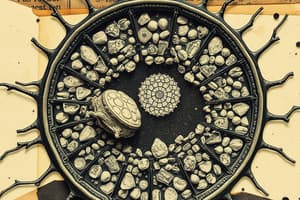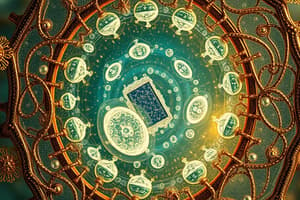Podcast
Questions and Answers
What is the Latin word for 'a little room'?
What is the Latin word for 'a little room'?
cell
What did Robert Hooke call the small compartments he observed in cork?
What did Robert Hooke call the small compartments he observed in cork?
cells
Why is the observation of cells in cork important in the history of science?
Why is the observation of cells in cork important in the history of science?
It was the very first time that someone had observed that living things appear to consist of separate units.
What year did Robert Hooke make his chance observation through a self-designed microscope?
What year did Robert Hooke make his chance observation through a self-designed microscope?
What substance did Robert Hooke examine to make his chance observation?
What substance did Robert Hooke examine to make his chance observation?
What did Robert Hooke discover in 1665?
What did Robert Hooke discover in 1665?
Who discovered the free living cells in pond water for the first time?
Who discovered the free living cells in pond water for the first time?
Who discovered the nucleus in the cell?
Who discovered the nucleus in the cell?
What is the fluid substance of the cell called?
What is the fluid substance of the cell called?
Who presented the cell theory, and what did it state?
Who presented the cell theory, and what did it state?
Flashcards are hidden until you start studying
Study Notes
Cellular Structure and Discovery
- The Latin word for 'a little room' is 'cellula', which is the origin of the term 'cell'.
Robert Hooke's Contributions
- Robert Hooke observed small compartments in cork and called them 'cells'.
- In 1665, Robert Hooke made a chance observation of cells in cork using a self-designed microscope.
- Hooke examined cork to make his chance observation, which led to the discovery of cells.
Importance of Cellular Discovery
- The observation of cells in cork is important in the history of science as it marked the beginning of cellular biology.
Other Cellular Discoveries
- Antonie van Leeuwenhoek discovered free living cells in pond water for the first time.
- Francis Crick and James Watson discovered the nucleus in the cell.
- The fluid substance of the cell is called protoplasm.
Cell Theory
- Matthias Jakob Schleiden and Theodor Schwann presented the cell theory, which states that all living organisms are composed of one or more cells, the cell is the basic unit of life, and all cells arise from pre-existing cells.
Studying That Suits You
Use AI to generate personalized quizzes and flashcards to suit your learning preferences.




